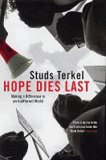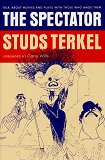
 Not available at Amazon.de!
Not available at Amazon.de!
If you want to buy this book second hand
(hardback, c. 440 pp),
send me an eMail
The price of it is € 20 incl. postage.
The story:
For the first time Studs Terkel portrays America as it is now and as it has changed over the last few years.
Here is the America that we have all lived through in the 1980s: the America of yuppies, Wall Street greed, right-wing
fundamentalism, Reaganite values, sixties activists who have become stockbrokers and real estate speculators.
Here at the same time is the other America: the backers of the Sanctuary movement, the obstinate liberals,
the teachers still fighting the good fight. Here too are all those caught in the middle, the people who have
seen the changes but who hesitate to transform their inner lives.
Terkel also explores the ways the great divide has changed private lives: a married couple consisting og a TWA flight attendant
who is on strike and her pilot husband who crosses her picket line; a police chief whose wife gets jailed
for anti-war demonstrations. And, more than in any other book, Terkel concerntrates on today's young people, the
kids who have no memory of the past, who think they are doing their professor a favor by showing up for class rather
than watching their favorite soap opera, who start investment clubs in high school, as well as the youngsters
beginning to question the 'me' decade.
This is Terkel's most immediate book, a book about the ways Americans have changed.
Extract from book:
From Clarence Page (39), who is a columnist and member of the editorial board of the Chicago Tribune:
"...My first exposure to race prejudice came when I was six years old. I was watching TV and I saw an advertisement for
an amusement park, near Middletown: Le Sourdville Lake. I said to my folks, 'Why don't we go there this weekend?' My parents
looked at each other, and finally my mother said little colored kids can't go to Le Sourdville Lake. That was the first time
I knew there was a difference. I think that something every little black kid knows in America: there's a difference.That
memory stuck with me all through my childhood.
Seeing the Little Rock incident on television affected me greatly, I'll never forget seeing a couple of National Guard troopers marching
with bayonets on their rifles behind a couple of girls. I has yet not heard of Martin Luther King.
...As a teenagers, I remembered the Freedom Riders. A lot of them started right from where we lived: the Western College
for Women, at Oxford, Ohio.
I was fascinated by the Freedom Riders. In '63, when the march on Washíngton occurred, there were black families
passing through. We put some of them up in a spare room in our house...They put 'em up because they were good
Christian people. You always welcome strangers at the back door, take 'em in, and give 'em a warm meal, that kind of thing.
My father was a deacon in the Baptist Curch. My mother bakes sacrament bread every month, on the forst Sunday.
...There were all these freedom rallies and sit-ins in the South. There was the beginning of the antiwar movement,
just starting out in Berkeley. Kennedy had just been assassinated. The Beatles were rolling in. A cultural
upheaval. I wanted to be part of that." ....
About the author:
 Louis (Studs) Terkel, the third son of Russian-Jewish parents, was born in the Bronx on 16th May, 1912. Eleven
years later the family moved to Chicago where his father found work as a tailor. He later opened a rooming
house for immigrants.
Louis (Studs) Terkel, the third son of Russian-Jewish parents, was born in the Bronx on 16th May, 1912. Eleven
years later the family moved to Chicago where his father found work as a tailor. He later opened a rooming
house for immigrants.
After graduating from high school in 1928, Terkel went to the University of Chicago where he received a law
degree in 1934. The following year he found work producing radio shows as part of the Federal Writers Project.
Terkel, who now adopted the name Studs (after the hero in James Farrell's novel, Studs Lonigan), also became
involved in the Chicago Repertory Theatre.
On the outbreak of the Second World War Terkel attempted to join the army but was rejected because of a
perforated eardrum. He joined the Red Cross but he was not allowed to serve overseas. He later discovered
that this was because of his left-wing political views.
During the 1940s Terkel became a familiar voice on radio working as a news commentator and disc jockey. He
also acted and appeared on several television programmes. In 1949 Terkel began his own television show, Studs'
Place, an improvised sitcom where he played himself as a restaurant owner.
After being investigated by Joseph McCarthy and the House Un-American Activities Committee in 1953, his
contract was cancelled. Terkel refused to give evidence against other left-wing activists and was therefore
blacklisted and prevented from appearing on television.
Terkel eventually found employment with the Chicago Sunday Times where he wrote a regular jazz column. He also
acted in various plays including John Steinbeck's Of Mice and Men. In 1958 he started his long-running daily
radio programme on WFMT, the Studs Terkel Show.
In the 1960s Terkel became interested in oral history. His first book on the subject, Division Street: America
(1967), contained interviews with seventy people who had lived in Chicago. This was followed by Hard Times
(1970), which featured interviews with Americans talking about their experiences of the Depression, and
Working (1974), an account of people's working lives.
Other books in the same style by Terkel include American Dreams: Lost and Found (1980), the Pulitzer Prize
winning The Good War (1985), The Great Divide (1988), Race (1992), Coming of Age (1995), Talking to Myself:
A Memoir of My Times (1995), My American Century (1998), American Dreams: Lost and Found (1999). His latest
book, Will the Circle be Unbroken? (2001), is about death.
Terkel has been described as a historian and a sociologist but he prefers to call himself a
"guerrilla journalist with a tape recorder".
Buchdaten:
THE GREAT DIVIDE by Studs Terkel
Sprache: Englisch
Erscheinungsdatum: 1. August 1989
Pantheon Books, New York
ISBN: 0394570537
Preis: € ???
More works from the same author:
zurück zur Übersicht
|
 Not available at Amazon.de!
Not available at Amazon.de!
 Louis (Studs) Terkel, the third son of Russian-Jewish parents, was born in the Bronx on 16th May, 1912. Eleven
years later the family moved to Chicago where his father found work as a tailor. He later opened a rooming
house for immigrants.
Louis (Studs) Terkel, the third son of Russian-Jewish parents, was born in the Bronx on 16th May, 1912. Eleven
years later the family moved to Chicago where his father found work as a tailor. He later opened a rooming
house for immigrants.



